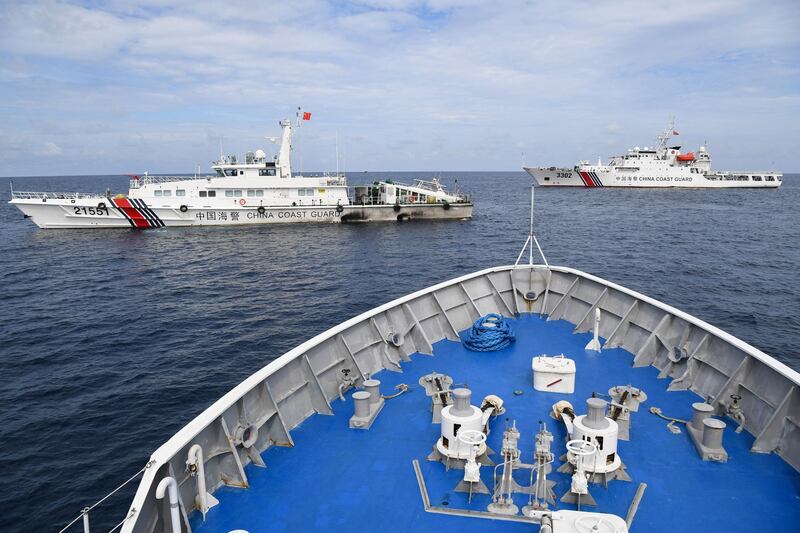Visiting Australian Prime Minister Anthony Albanese reaffirmed Canberra’s support for Manila’s South China Sea claims Friday, as the two allies upgraded their defense ties amid Chinese efforts to block Philippine supply boats in disputed waters.
Meanwhile, the Philippine government announced that it had completed another resupply mission to the BRP Sierra Madre, a grounded World War II-era ship that serves as Manila’s military outpost in Ayungin (Second Thomas) Shoal.
Albanese met with President Ferdinand Marcos Jr. at the presidential Malacañang Palace in Manila, where they signed a “Joint Declaration on Strategic Partnership.” This upgrades the bilateral partnership to include possible joint patrols in the South China Sea, as well as more and larger joint exercises between Philippine and Australian forces.
Both men arrived from Indonesia where they had attended a summit between the Association of Southeast Asian Nations (ASEAN) and its partners. Other countries represented at the meetings in Jakarta included China and the United States, another Western ally that backs the Philippines in the territorial dispute.
Australia and the Philippines were bound by “strategic trust, shared values and mutual cooperation,” Albanese said on Friday.
“Our friendship is underpinned by trust and respect as well as shared vision for the region,” the Australian PM added, stressing that his government would keep working with Manila “to shape a region where sovereignty is uphill and economic cooperation is underpinned by international rules-based trade.”
Marcos thanked Albanese for Australia’s staunch backing of the Philippines, which has been engaged in a diplomatic tussle with China over the South China Sea.
In early August, the China Coast Guard fired water cannons at a Philippine Coast Guard ship as its escorted civilian boats delivering supplies to the Sierra Madre. Later that month, Chinese ships harassed another resupply convoy.
On Friday, the latest resupply mission to the BRP Sierra Madre was completed successfully, although Chinese coast guards ships tried to block the supply ships, the National Task Force for the West Philippine Sea (NTF-WPS) said.
The China Coast Guard countered that the Philippines had conducted an “illegal intrusion” into the shoal, which it calls Ren’ai Reef.
"The China Coast Guard strictly warned the Philippine vessels in accordance with the law, tracked and monitored the vessels all the way and effectively regulated them," it said in a statement.
“China has indisputable sovereignty over the Nansha islands, including the Ren’ai Reef, and its adjacent waters, and firmly opposes the illegal transportation of construction materials by the Philippines to the illegal[-ly] grounded warship.”

On Friday, Marcos thanked the Australian leader for backing Manila during the ASEAN meetings where Albanese, he said, had “made very clear that the claims … being made upon Philippine maritime territory are not valid and have not been recognized and are not in conjunction or consistent with international law.
“To have friends like you and partners like you, especially on that subject is very gratifying and encourages us to continue down that path,” Marcos said.
Albanese said Australia was fully behind the Philippines in demanding that international law be upheld in staking claims in the South China Sea. Other ASEAN members – Brunei, Malaysia and Vietnam – also claim parts of the strategic waterway.
Taiwan, which China considers a renegade province, is another claimant.
“We have collective responsibility for security, including support for the United Nations Convention on the Law of the Sea. UNCLOS, that’s very important,” Albanese told Marcos, according to transcripts of the meeting.
Diplomatic ties
Albanese and Marcos then signed the strategic partnership agreement and agreed to a five-year program aimed at reducing violent conflicts and reintegrating former Muslim separatist rebels in the southern Mindanao region to society.
Diplomatic ties between the Philippines and Australia were established in 1946, with relations covering a wide range of areas from defense and security to economic cooperation.
Australia is the Philippines’ second largest defense partner of the Philippines and is one of only two partners with whom the Philippines has a Status of Visiting Forces Agreement. The other is the United States.
Australia was the Philippines’ 14th largest trading partner in 2022 and was among the top sources of official development assistance – a total of Australian $180 million (6.5 billion pesos) – according to the foreign department.
Filipinos make up the fifth largest immigrant community in Australia, at 400,000, while nearly 30,000 Australian nationals consider the Philippines home.
BenarNews is an RFA-affiliated media outlet.
